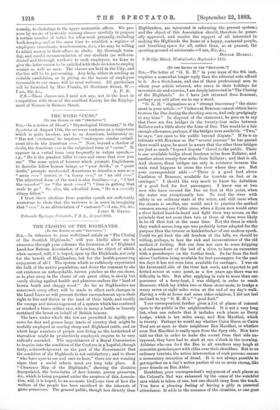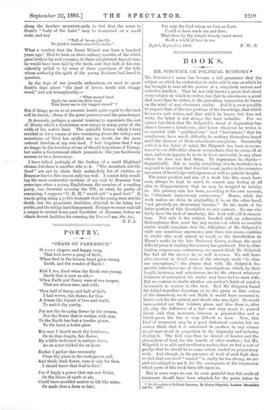[TO THE EDITOR OF THE " SPECTATOR."]
Sm,—The letter of "G. K. H." in your issue of the 8th inst- requires a somewhat longer reply than the editorial note affixed to it. As a Scotchman, and one of those professional men to whom your article referred, who crave in their holidays for mountain air and exercise, Tam deeply interested in "The Closing of the Highlands." As I have just returned from Braemar,. perhaps you will allow me to say a word.
"G. K. H." stigmatises as a "strange inaccuracy" the state- ment in your artidle :—" Visitors at Braemar cannot obtain leave- to cross the Dee during the shooting season, and only grudgingly at any time." In disproof of the statement, he goes on to say that there are five bridges in the twenty-four miles between Ballater and a little above the Linn of Dee. This would be a fair enough allowance,.perhaps, if the bridges were available. "Two," he says, "are open to the public beyond dispute." If he is as intimate with Braemar as the "several seasons" he has passe& there would argue, he must be aware that the other three bridges. are jest as much "beyond dispute" closed to the public. There is one available bridge about fourteen miles from Ballater, and another about twenty-four miles from Ballater ; and. that is all. And observe, these bridges are only in existence because the main road happens to cross the river where they are. But your correspondent adds :—" There is a good ford above Castleton of Braemar, available for tourists on foot or in carriages." I should like very much to know his definition of a good ford for foot passengers. I know one or two, men who have crossed the Dee on foot at this point, when the water was exceptionally low. To ford the river with safety in an ordinary state of the water, and still more when stream is swollen, one would need to practise the method common among our Celtic sires, when a dozen men would enter a river linked hand-in-hand and fight their way across, on the principle that not more than two or thqe of them were likely to be off their feet at the same time. But the dress in which they waded across long ago was probably better adapted for the purpose than the trouser or knickerbocker of our modern epoch. Could we get back the old freedom of the hills, we should be willing, perhaps, to face the risk and inconvenience of the old method of fording. But one does not care to come dripping.- a id exhausted out of the bed of a river, to have an encounter with a gamekeeper on the further bank. So far from the ford above Castleton being available for foot-passengers, for the past ten days it has not even been available for carriages. I was on the Invercauld side of the river last week, and expected to get ferried across at some point, as a few years ago there was no. difficulty in this. But after applying in vain to more than one. possessor of a ferry-boat, I was obliged, in order to reach Braemar, which lay within two or three stone-casts, to trudge a, weary seven or eight miles extra at the end of my day's walk.. Having a wife at home and some other relatives, I did not feel inclined to try "G. K. H.'s" " good ford."
Your correspondent further gives a list of places of interest open to the public in the neighbourhood. It is not a very long list, when one reflects that it includes such places as Derry Lodge, which is ten miles away, and. Ben Macdhui, which is twenty. Perhaps he would say whether Cairn Gorm or Cairn Toni are as open as their neighbour Ben Macdhui, or whether even Ben Macdhui is really open from the Spey side. Men have told me that in order to make the ascent from that side un- opposed, they have had to start at one o'clock in the morning. Athletes who can ford the Dee in all weathers may laugh at muscular gamekeepers with rifles over their shoulders. But to us ordinary tourists, the active intervention of such persons causes a momentary sensation of dread. It is not always possible to get together on a day's notice parties of six or seven strong, like your friends on Ben Alder.
Doubtless, your correspondent's enjoyment of such places as the Colonel's Bed was enhanced by the sense of the watchful care which is taken of one, lest one should stray from the track. You have a pleasing feeling of having a gilly in personal attendance. It adds to the romance of the situation, as one goes
along the desolate mountain-path, to feel that the scene in Scott's "Lady of the Lake" may be re-enacted on a small acale, and any
"Tuft of broom give life To plaided warrior armed for strife."
'What a comfort that the Great Wizard was born a hundred years ago ! Had he been on those solitary rambles of his which gave birth to lay and romance, in these enlightened days of ours, he would have been laid by the heels, and that halt of his con- aiderably added to by some of those guardians of the hills whose authority the spirit of the young Borderer had dared to -question.
In the days of our juvenile enthusiasm, we used to quote Scott's lines about "the land of brown heath and shaggy wood," and ask triumphantly,—
" 'What mortal band
Shull e're untie the filial band That knots me to thy rugged strand" ?
But if things go on as at present, hands quite equal to this task will be found,—those of the game preserver and the gamekeeper. It demands, perhaps, a special training to appreciate the sort of liberty which a Scotchman now enjoys in many parts of the wilds of his native land. The splendid licence which I have aevelled in for a season or two wandering about the valleys and mountains of Tirol has spoiled me. no doubt, for the more ordered freedom of my own land. I had forgotten that I was sm longer in the territory of one of the old despotisms of Europe, but under a Government which journalists like you facetiously assume to be a democracy.
I have talked jestingly of the fording of a rapid Highland stream, but there is another side to it. "The mountain and the flood" are apt to claim their melancholy list of victims, as Braemar knows this season only too well. I cannot help recall- ing the most memorable incident of my visit to Braemar four years ago, when a young Englishman, the member of a reading party, was drowned crossing the Tilt, at what, by parity of reasoning, I suppose G. K. H." would call "a good ford." It was in going along a public footpath that the young man met his death, but the proprietor doubtless objected to its being too public, and the bridge had disappeared. Perhaps we must wait till a corpse is carried down past Castleton of Braemar, before we obtain decent facilities for crossing the Dee.—I am, Sir, &c., E. F. J.



































 Previous page
Previous page